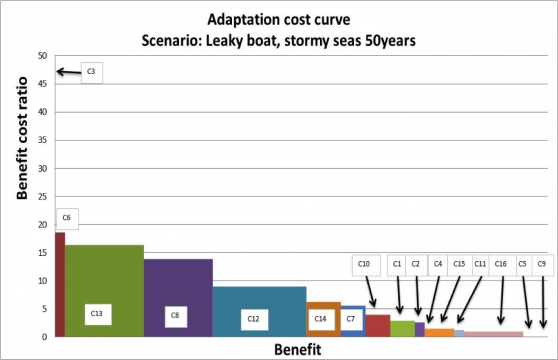Economics of climate change adaptation at the local scale under conditions of uncertainty and resource constraints: the case of Durban, South Africa


Results for Durban’s cost-benefit prioritisation under a particular socio-economic and climate future
Abstract
This paper describes the design and application of a benefit-cost model to the city of Durban’s (South Africa) climate change adaptation options. The approach addresses the inability to compile an accurate damage-cost function for economic prioritizations at the local level. It proposes that uncertainty over climate impacts and the efficacy of adaptation responses, in conjunction with the lack of economic data, high levels of economic informality and inequality make it difficult to link adaptation efforts to positive GDP impact in Durban. Instead, the research based its calculations of “benefits” on the number of people impacted and the extent of the welfare benefits imparted by the respective adaptation efforts. It also took into account the uncertainty over future events, capacity constraints, priorities of decision makers and the risk of maladaptation. The results were reported as benefit-cost ratios for 16 clusters of interventions (many of which were primarily the responsibility of one municipal department or agency) in each of four future scenarios (defined by minor or major climate change and weak or strong socio-institutional capacity). The paper presents and discusses the benefit-cost ratios and total benefits for each of the intervention clusters in each of the future scenarios. It emphasizes how these are influenced by choices of time frames. It also highlights how the most efficient interventions across all futures and time frames tend to be socio-institutional − for instance the creation of a cross-sectoral disaster management forum, sea level rise preparedness and early warning system, and creating climate change adaptation capacity within the water services unit. Ecosystem-based adaptation measures had moderate benefit-cost ratios, probably because in Durban the land that needs to be purchased for this is relatively expensive. Infrastructure-based clusters generally had the lowest benefit-cost ratios.
Citation
Cartwright, A., Blignaut, J., Wit, M.D., Goldberg, K., Mander, M., O’Donoghue, S., Roberts, D., 2013. Economics of climate change adaptation at the local scale under conditions of uncertainty and resource constraints: the case of Durban, South Africa. Environment and Urbanization.
(0) Comments
There is no content